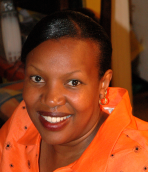The Sky is the Limit
 |
| Sheila Amdany |
Q. Are you a journalist by profession?
A. No
Q. Tell us about your career life
A. My background is marketing and advertising. I have worked at East African Breweries Limited, MCL Saatchi & Saatchi Nairobi as the Accounts Director and later Managing Director in the same company.
Q. What motivated you towards journalism?
A. What attracted me to media was the potential to influence
Q. When did you start your radio station?
A. Radio Simba started in August 2004; after some feats in the industry in September 2003. It broadcasts from Nairobi covering a 50Km radius and roll out is currently headed towards Nakuru, Mombasa, Eldoret, Kisumu, Nyeri and Meru towns.
Q. What challenges did you face then, and now?
A. Most of my challenges are financial. Capital investment in media before returns is high.
Q. Do you regret going to the private sector?
A. Not at all.
Q. Who are your target audience?
A. Kenyan men and women aged between 20-40 living in urban and peri urban
Q. How do you outdo your competitors?
A. Our competitors are Kenya Broadcasting Corporation, Citizen Radio and Classic 105. We out do them through our music which is purely local. Radio Simba is an African station that offers music drawn from local, regional and African Diaspora. It promotes varied music styles – local hip hop, Benga, Lingala, Zuk, Reggae, Swahili, East, West and South African music.
Q. What is your vision?
A. To be the premier media group at the forefront of technology and be the most innovative media group in the region.
Q. What advantage does the radio industry have over other media firms?
A. Radio's key advantage over other media is availability. Radio ownership in Kenya and
Q. How is the radio a tool for fighting poverty?
A. Radio reaches people in most remote areas and is used as an educational and development tool to inform audiences on how they can improve their lives.
Q. Are you married?
A. No.
Q. If you were married, how would you balance your profession and home affairs?
A. That’s difficult to say since I neither have a husband nor children. However, I feel that if one has a supportive family environment, one can tackle anything.
Q. What advice would you give to upcoming investors?
A. Invest in
Q. Where do you see yourself ten years from today?
A. Hopefully a mother, a radio investor in other East and Central African countries, a key developer in other media products and a mentor to many!
